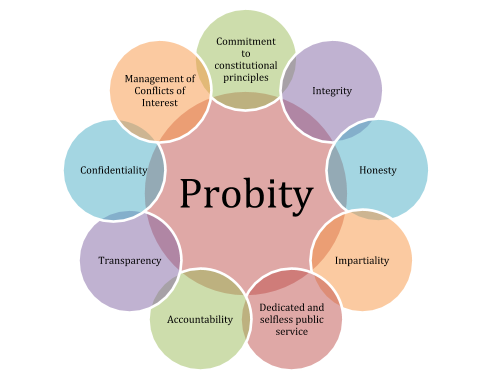-
28 Aug 2024
GS Paper 4
Theoretical Questions
Day 45:In public life, Probity is not just a virtue; it is a necessity. Comment.(150 words)
Approach
- Give a brief introduction about Probity.
- State the importance of Probity in Public life.
- Give suitable examples.
- Conclude suitably.
Introduction
Probity literally means a complete and confirmed integrity. It goes beyond being merely a virtue; it is a necessity for ensuring that public administration and governance operate effectively and justly. Probity encompasses a commitment to moral conduct that fosters trust, accountability, and transparency, which are crucial for the functioning of democratic institutions.
Body
Importance of Probity in Public Life
- Building Public Trust: Probity fosters public confidence in governmental institutions and officials. When public servants act with integrity, they demonstrate that they are worthy of the public’s trust, which is crucial for the effective functioning of democracy.
- For example, T.N. Seshan, as Chief Election Commissioner of India, upheld strict electoral norms, transforming the Election Commission into a credible and independent body. His commitment to probity enhanced public trust in the electoral process.
- Preventing Corruption: A commitment to probity acts as a deterrent to corruption and unethical behavior. By adhering to principles of honesty and transparency, public officials can avoid conflicts of interest, misuse of power, and the misappropriation of resources.
- Vinod Rai, the former Comptroller and Auditor General (CAG) of India, his meticulous auditing and exposure of the 2G spectrum and coal block allocation scams highlighted large-scale corruption.
- Ensuring Fair Decision-Making: Probity ensures that decisions are made impartially and based on merit, rather than personal gain or favoritism. This fairness is fundamental to achieving justice and equity in public policies and administration.
- The Supreme Court’s intervention in the coal allocation scam is an example of how enforcing probity in decision-making ensures fairness and justice.
- Maintaining Institutional Integrity: The integrity of public institutions depends on the probity of the individuals within them. Without probity, institutions risk losing their credibility and effectiveness, leading to a breakdown in governance and public order.
- E. Sreedharan, known as the "Metro Man," maintained high standards of integrity while overseeing the Delhi Metro project, ensuring its timely and corruption-free completion, which reinforced the credibility of the institutions involved.
Conclusion
In public life, probity is not just a virtue but a necessity. It is the foundation upon which trust, fairness, and integrity are built, ensuring that public servants fulfill their duties with honesty and responsibility. In a world where the misuse of power can have far-reaching consequences, probity is essential for maintaining the health and stability of democratic institutions.





